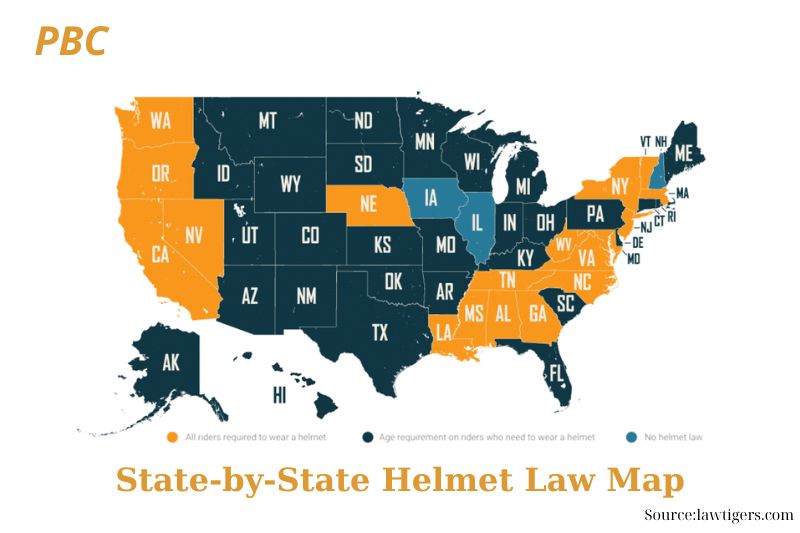Understanding motorcycle helmet laws by state is crucial for every rider. At Pennbook, we provide the latest updates and regulations to ensure you stay informed and safe on the road. Dive into our comprehensive guide at pennbookcenter.com.
Overview of Motorcycle Helmet Laws in the United States

Introduction to the Importance of Helmet Laws
Motorcycle helmet laws play a crucial role in promoting rider safety and reducing injuries. Helmets are proven to protect against serious head injuries in the event of an accident.
According to the National Highway Traffic Safety Administration (NHTSA), helmets are 37% effective in preventing fatal injuries to motorcycle riders and 41% for motorcycle passengers.
Helmet laws ensure a higher compliance rate among riders, thereby significantly reducing the number of severe injuries and fatalities on the roads.
Benefits of Helmet Laws in Reducing Injuries
- Helmets provide essential protection in crashes.
- They reduce the likelihood of severe head trauma.
- Helmet use is linked to lower healthcare costs due to fewer injuries.
Brief History and Evolution of Helmet Laws

Helmet laws have evolved significantly over the decades. Initially introduced in the 1960s, these laws have seen various amendments and changes across different states. Key historical milestones include:
- 1967: The Federal Highway Safety Act was enacted, encouraging states to adopt helmet laws.
- 1975: Many states repealed or weakened their laws after federal incentives were removed.
- 2000s: Renewed focus on motorcycle safety led to stricter helmet laws in several states.
General Overview of Federal and State Regulations
Federal Guidelines on Helmet Standards
The Department of Transportation (DOT) sets federal standards for helmet safety, requiring helmets to meet specific criteria for impact resistance, retention system strength, and penetration resistance. Helmets that meet these standards bear a DOT certification.
How State Regulations Differ from Federal Guidelines
While the DOT provides overarching safety standards, individual states have the authority to implement and enforce their own helmet laws. These laws vary widely:
- Some states have universal helmet laws requiring all riders to wear helmets.
- Others have partial laws, typically requiring helmets for riders under a certain age.
- A few states have no helmet laws at all.
State-by-State Helmet Law Requirements

Detailed Breakdown of Helmet Laws for Each State
Here is a summary of helmet laws in different states. For a quick reference, please consult the following table:
| State | Helmet Law Type | Age Requirement | Compliance Standard |
|---|---|---|---|
| California | Universal Helmet Law | All ages | DOT |
| Texas | Partial Helmet Law | Under 21 | DOT |
| Florida | Partial Helmet Law | Under 21 or less than $10,000 medical insurance | DOT |
| Illinois | No Helmet Law | None | N/A |
| New York | Universal Helmet Law | All ages | DOT |
Age-Specific Requirements and Exemptions
States with Universal Helmet Laws vs. Age-Specific Laws Universal helmet laws apply to all riders regardless of age, whereas age-specific laws mandate helmet use only for certain age groups. For example:
- California requires all riders to wear helmets.
- Texas mandates helmet use for riders under 21.
Details on Age Exemptions and Additional Requirements In states with age-specific laws, exemptions may apply. For instance:
- Florida allows riders over 21 to ride without helmets if they have at least $10,000 in medical insurance coverage.
- Some states may have additional requirements such as wearing eye protection.
State-Specific Compliance Standards
Specific Standards Required by Different States Compliance standards often refer to DOT certification, but some states may accept other certifications such as Snell or ECE.
It is crucial for riders to understand the specific requirements of their state to ensure their helmets meet the necessary safety standards.
Helmet Features and Certifications Needed for Compliance
- DOT Certification: Federally recognized standard ensuring minimum safety requirements.
- Snell Certification: A voluntary, more rigorous testing standard.
- ECE Certification: European standard accepted in some states.
For more detailed and updated information on helmet laws by state, please refer to the Insurance Institute for Highway Safety (IIHS).
FAQs about MC Helmet Laws by State

What states have universal motorcycle helmet laws?
Universal helmet laws require all riders, regardless of age, to wear a helmet. States with these laws include California, New York, Nevada, and Louisiana.
Are there any states without motorcycle helmet laws?
Yes, Illinois and Iowa do not have any motorcycle helmet requirements, making helmet use optional for all riders.
Are there specific helmet standards that need to be met?
Yes, helmets typically need to meet DOT (Department of Transportation) standards. This ensures that helmets provide adequate protection during an accident.
Do any states require additional safety gear along with helmets?
Yes, some states require additional safety gear. For example, Maryland requires all riders to wear helmets and eye protection unless the motorcycle has a windscreen. Similarly, Minnesota requires eye protection for all riders.
What are the penalties for not wearing a helmet where it’s required?
Penalties vary by state. For example, in California, the fine for not wearing a helmet is $250. In Florida, it’s $15, but this can increase with other violations.
Are there exceptions for certain types of motorcycles or vehicles?
Yes, some states have exceptions. For instance, Vermont allows exceptions for fully enclosed vehicles, and in Missouri, riders over 26 with health insurance can opt out of wearing a helmet.
Why do some states not have universal helmet laws?
Some states value personal freedom and choice over mandatory safety regulations. They argue that experienced riders can make their own safety decisions.
How do helmet laws affect motorcycle accident claims?
Helmet use can influence personal injury claims. For instance, in states like Nevada, failure to wear a helmet might impact the compensation you receive if you are injured in an accident, as helmets significantly reduce the risk of severe head injuries.
Conclusion
Staying informed about motorcycle helmet laws ensures you ride safely and legally. For more details on protecting yourself and your bike, check out our comprehensive guide on Motorcycle Insurance Cover.
